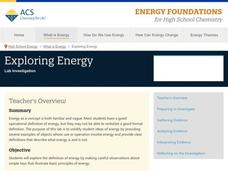University of Florida
Protecting Our Water Resources
Teach young environmentalists to protect their planet's resources with a set of interactive experiments. Kindergartners and other youngsters learn about watersheds and the water cycle, while older elementary learners focus on fertilizer...
Newspaper Association of America
Cereal Bowl Science and Other Investigations with the Newspaper
What do cereal, fog, and space shuttles have to do with newspapers? A collection of science investigations encourage critical thinking using connections to the various parts of the newspaper. Activities range from building origami seed...
US Environmental Protection Agency
Non-Point Source Pollution
Investigate the different types of pollution that storm drain runoff carries into oceans, lakes, rivers, and streams with this class demonstration. Using an aquarium and an assortment of everyday items that contaminants like motor oil,...
Institute of Electrical and Electronics Engineers
Can You Canoe?
A neat handout immerses learners in the history of canoe making. After reading, small groups of mini engineers work to craft a canoe that will not be immersed! This is an ideal exercise in engineering design for your STEM curriculum or...
Teach Engineering
Exploring the Lotus Effect
The Lotus Effect ... is it not some kind of yoga pose. In the last installment of a nine-part series, young scientists observe the Lotus Effect on lotus leaves and water-repellent cloths. They observe how motion and damage affect the...
Teach Engineering
Red Cabbage Chemistry
Using the natural pH indicator of red cabbage juice, groups determine the pH of different everyday liquids. As they work, pupils gain an understanding of pH that may help deal with contaminants in the water supply.
It's About Time
Elements and Their Properties
How did ancient scientists classify elements? Answer this question and others as young chemists create a device to test the properties of various elements. They classify elements as metals or nonmetals, learn to differentiate...
American Chemical Society
Exploring Energy
When asked to list everyday objects that require energy, most people list technology that use batteries or electricity. Through hands-on exploration, young scientists discover energy is much more than just circuitry. They play with...
Teach Engineering
Density Column Lab - Part 1
Mass and density — aren't they the same thing? This activity has groups use balance beams and water displacement to measure several objects. The pupils use the measurements to calculate the density of the objects.
K-State Research and Extensions
The Crusty Earth
Geology rocks — literally! A geology chapter offers eleven activities at four different levels. Scholars enjoy completing hands-on experiments before applying critical thinking skills following a share, process, generalize, apply,...
DiscoverE
Working with Watermills
Water is a powerful force; harness it through watermills. The task at hand is to create a simple watermill that functions in flowing water for at least three minutes. Scholars work together in teams to design and construct such a...
University of Wisconsin
Conjunction Function
As part of a unit, this activity familiarizes youngsters with components of a rain garden. They speculate about the role of an assigned component in contributing to a rain garden, and ultimately, in the health of the local watershed....
Science Buddies
Science Buddies: Are You Gellin'?
Chances are, you have several materials around your house made of gelatinized materials. Gels are used in all kinds of products and materials: pudding, diapers, insoles, packaging, ice cream, toothpaste, and much more. In this project,...
Technovation
Curiosity Machine: Challenges: Build a Hydroelectric Waterwheel
Can you generate electricity from the flow of water by designing a waterwheel? In this challenge, students will be using everyday objects to create their waterwheel. This site contains a lesson plan, tips, and a place for students to...















